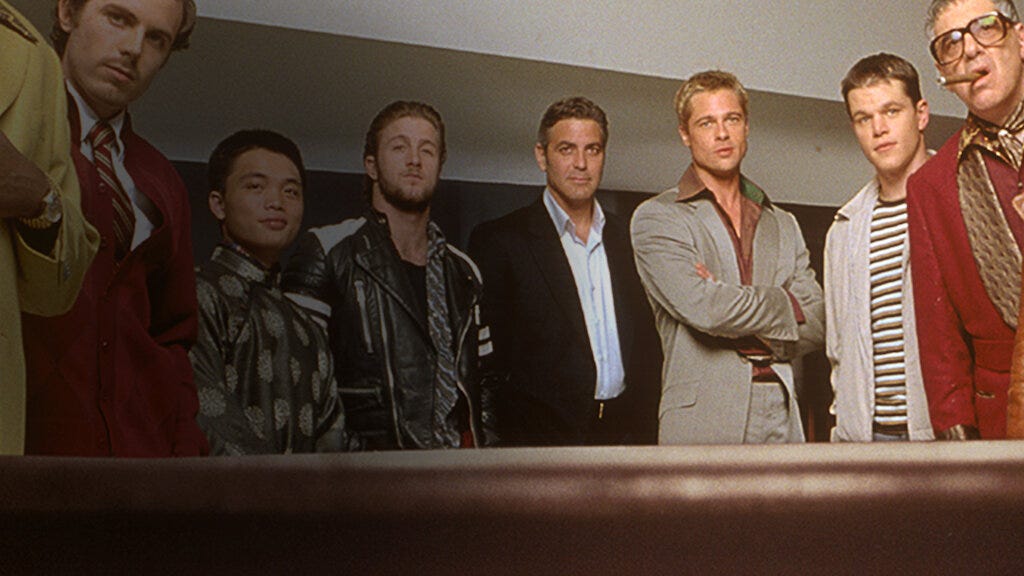Everybody’s a Critic. So Stop Hating Critics.
Critics mostly like the same things everyone likes.
This came out in January 2022. It’s no longer online, and everyone still hates critics, so I figured I’d reprint it.
____
Everyone hates critics. Yair Rosenberg in his Atlantic newsletter reiterated all the reasons why. Critics, he asserted, slag popular stuff. They are stuck in an elitist bubble and don’t understand the common moviegoer. They’re politics-obsessed lefties. What’s to like?!
Rosenberg is a politics writer, not a cultural critic, and it shows. Basically everything he says about critics, about leftists, about bubbles, and about politics in art is laughably and gratuitously inaccurate.
It’s worth responding to for a few reasons though. First, the Atlantic is a massive and influential venue; many people read Rosenberg’s writing and assume he knows what he’s talking about. Second, as I’ve already indicated, his arguments feed into many common misconceptions about critics and criticism. And, third, those misconceptions can be actively dangerous. In a cheerful, centristy, mainstream media Atlantic trend piece way, Rosenberg is feeding into right populist narratives that quite often get critics targeted for death threats and worse.
Critics Are Not Jaded Anti-Populists
Rosenberg points to a number of trend pieces in outlets like Polygon and The Ringer that assert that Harry Potter films and Lin-Manuel Miranda films have become cringe, and are no longer popular. Rosenberg then points out that these films are still in fact doing well at the box office. He concludes, “The problem with being a professional critic is that you end up consuming so much culture that you stop processing it like a normal person. Once you’ve seen your 20th car chase of the year, the novelty begins to wear off.” Critics are too jaded to love “a banal superhero movie or the latest Harry Potter or Star Wars release” the way normal audiences do.
The problem here is that the trend pieces Rosenberg is relying on are largely incorrect. Trend pieces need to make big sweeping statements; people who write for those sites are often scrabbling through twitter desperate for some sort of news hook controversy. But most critics mostly write reviews. And among such reviewers, there is not some sort of massive critical backlash against Harry Potter or Lin-Manuel Miranda or action franchise blockbusters. This is easy to confirm if you spend a few minutes googling around in Rotten Tomatoes.
Here are critic and audience scores for some relevant films.
In most cases when you’re looking at popular blockbusters, critic scores fall just slightly below audience scores, as with the Harry Potter films and Lin-Manuel Miranda’s latest, Encanto.
The critic lag isn’t because critics are jaded. It’s because critics are paid to see movies they wouldn’t go see on their own. Movie audiences are self-selecting. People don’t go watch films in genres or with actors they know they are going to dislike. Critics have to see movies whether they want to or not.
You’d think that would mean critics scores would be much lower than audience scores for most films. But as it happens, most critics are extremely enthusiastic movie fans and love watching just about anything that flickers on a wall. So movie geeks who want to see everything and normal folks who want to see only the films they like end up in about the same place most of the time.
Sometimes there are weird discrepancies between critics and audiences. I’ll talk about the Star Wars: The Last Jedi—which fans liked less than critics—a little later. But Rosenberg also points to Red Notice, a Netflix spy movie that critics hated (RT: 37%) and fans loved (RT: 92%).
Rosenberg, who hasn’t seen Red Notice, says, “To put it gently, it’s not the sort of film designed to tickle the senses of cultural epicures.” I, who have seen Red Notice twice, and loved it, can say, with gentle authority, that this is nonsense. Red Notice is a film about acting and pretense which is obsessed with the pretense and make-believe of film. It compulsively references other movies, from blockbuster’s like Jurassic Park to classics like Sullivan’s Travels—and I’m pretty sure you don’t reference Sullivan’s Travels for casual moviegoers. You do that for the amusement of critics.
Critics weren’t amused though. Why? I could posit some theories, but really I’d just be guessing. It’s not the genre, as Rosenberg claims; critics like lots of light heist blockbusters (Ocean’s Eleven: Critics 83%, Audience 80%).
Sometimes something about a particular marketing campaign, or star roster, or just the alignment of the planets puts critics and audiences at odds. Reactions to art are weird and hard to predict, which is part of what makes art fun. But these disjunctions between critic and audience are notable because they’re rare. For the most part, if people like a movie, critics like the movie, which makes sense since critics are a subset of people.
Critics Are Not Politically Obsessed Leftists
Critics, Rosenberg argues, live in a twitter internet bubble where they prioritize the political conversation around art more than the art itself. “The deep-seated need to justify one’s own relevance is how we end up with cultural criticism that evaluates art as politics, rather than as art which also has political elements,” he insists.
It’s true that cultural critic’s sense of public opinion can be warped both by twitter and by the strong institutional incentives to write sweeping trend pieces. These factors are at play in the trend pieces Rosenberg cites as evidence. They’re also at work in his own essay.
But, again, there isn’t actually a disconnect between critic reactions and audience reactions. That’s in part because critics and twitter progressives are not the same people. There’s some overlap (like me!) But for the most part, critics are people who love movies and want to go and see a lot of movies. Many regular reviewers don’t even necessarily have a huge twitter presence.
Critics are disproportionately based in cities where you can see previews, and so their politics do tilt towards the politics of people who live in cities—which means they’re more likely to be Democrats than Trump supporters. But there’s still plenty of resistance among critics to left political critiques of film.
Rosenberg himself acknowledges, for instance, that the outlets that run trend pieces about a political backlash against Harry Potter and Lin-Manuel Miranda run lots of other fandom pieces about those topics. Rosenberg seems to think this is a sign of hypocrisy. But doesn’t it indicate instead that culture writers and culture sites are doing precisely what he asks, and refusing to allow politics “to dominate and color every piece of commentary they write”?
Further, I can report that critics themselves often call for discussions of politics in art to be toned down. When I have written pieces discussing Hitchcock’s misogyny, or David Lynch’s flirtation with ableism, film twitter did not embrace me with open arms as a fellow traveler. And check out the reaction to Don’t Look Up; you’ll find lots of critics complaining that the movie’s political satire was too loud and strident. (Audiences liked it much better.)
Critics do talk about politics in many cases. That’s because films are often blatantly, deliberately, intentionally about politics, first and foremost. Lin-Manuel Miranda is most famous for a musical about Alexander Hamilton; Encanto explicitly talks about political violence in Colombia. Harry Potter’s villain is a clear stand-in for Hitler.
And, as Rosenberg doesn’t quite acknowledge, JK Rowling has latterly made herself the face of an international transphobic hate movement. Rosenberg says that only those in the internet critic lefty twitter bubble really care about this. He conveniently ignores the fact that massively popular horror writer Stephen King and many of the actors in the Harry Potter franchise are on record rebuking Rowling. She didn’t take an active part in the 20th anniversary special. Though she denied it had anything to do with her transphobic comments, it seems plausible that she was reluctant to appear with a bunch of her peers who had publicly pointed out her bigotry.
How much and when and in what context to discuss politics in film is controversial and contested. But it’s not just critics who use films to think about politics. Actors do. Writers do. Filmmakers absolutely do. And so do audiences—which brings us to the most ominous downside of Rosenberg’s review.
Don’t Feed Critics to Right-Wing Populists, Please
Rosenberg’s article is not especially virulent. He is wrong, but polite and understanding when he claims that critics are out of touch lefty elitists who put too many politics in their reviews. However, there is a version of his argument that is a lot less gentile.
Why did Star Wars: The Last Jedi get such a terrible audience reaction number on Rotten Tomatoes? It’s not because audiences hated the film; it underperformed slightly, but still raked in $1.3 billion. But The Last Jedi starred many non-white, non-male leads. That prompted reactionary racist, sexist trolls to preemptively flood Rotten Tomatoes rankings to tank the score. This same subset of fans also launched a withering racist and sexist harassment campaign against Kelly Marie Tran, who played Rose Tico in the film.
This kind of reactionary, politicized fan troll campaign has also been aimed at reviewers. Anita Sarkeesian, a feminist YouTube critic who focuses on video games, was a primary target of the sexist harassment campaign Gamergate. For the crime of arguing that some games perpetuated sexist tropes she was targeted for years with rape and death threats. At one point she was forced to flee her home.
Film critics, too, have received death threats for negative (or even not particularly negative) reviews of Aquaman, Man of Steel, and others. Director Christopher Nolan actually defended fans who sent death threats to a critic of his movie The Dark Knight.
You could call this kind of vicious behavior fan entitlement. But you could also call it (reactionary) populism. Populism is a narrative; it identifies “elites” who are supposedly powerful and have a nefarious political agenda. It contrasts them with good, ordinary, people who must rise up and smite down the enemy.
Sometimes populists identify actual powerful people—like billionaire capitalists—as the elite. But often it’s more fun to target someone as powerful who really is not and is therefore vulnerable. Critics fit the bill—especially critics who are women, Black, LGBT, or marginalized in other ways. Critics have a small audience, which can make them look important or influential to some random passerby on social media. But most critics aren’t rich, and they generally aren’t even that important to the media institutions they work for. That is, if they’re lucky enough to have an institutional affiliation. Lots of critics don’t in these days of journalistic cutbacks and precarious freelancing.
The populist Trumpian right is already primed to hate journalists and the mainstream media. Framing critics as disconnected liberal elites who politicize art is putting a huge target on their backs. It also lends credence to, and spurs organizing by, dangerous reactionaries.
Criticizing the Critic Criticizing Critics
Rosenberg claims that critics are stuck in an internet bubble. But he himself is so focused on trend pieces he didn’t even check Rotten Tomatoes. And he’s so busy spinning his own theories about who critics are and what they do that he’s oblivious to the ways that those comfortable, fact free narratives can affect people who for the most part make a lot less money and have a lot less support than he does in his comfortable perch at the Atlantic. Using your high profile platform to create poorly thought through and potentially explosive narratives about people less powerful than you isn’t good journalism. It’s not good criticism either.







